
Baiji is a city of about 173,677 inhabitants in Salah ad Din governorate in northern Iraq. It is located some 130 miles north of Baghdad, on the main road to Mosul. It is a major industrial centre best known for its oil refinery, the biggest in Iraq, and has a large power plant. With regards to transport in the area, Baiji is a junction of the national railway network.

The Islamic Army in Iraq (IAI) was one of a number of underground Islamist militant organizations formed in Iraq following the 2003 invasion of Iraq by U.S.-led Coalition forces, and the subsequent collapse of the Ba'athist regime headed by Saddam Hussein. IAI was regarded as one of the largest, sophisticated and most influential Sunni insurgent groups in Iraq that led an asymmetrical military insurgency against Coalition forces. The group became known for its grisly videos of kidnappings and attacks on U.S. and Iraqi troops.
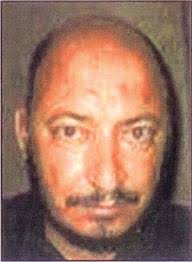
Hamid Dawud Mohamed Khalil al-Zawi, known as Abu Hamza al-Baghdadi and Abu Omar al-Qurashi al-Baghdadi, was the leader of the Islamic militant coalition Mujahideen Shura Council (MSC), and its successor, the Islamic State of Iraq (ISI), which fought against the forces of the U.S.-led coalition during the Iraqi insurgency.
The 2008 Nineveh campaign was a series of offensives and counter-attacks between insurgent and Coalition forces for control of the Nineveh Governorate in northern Iraq in early-to-mid-2008. Some fighting also occurred in the neighboring Kirkuk Governorate.
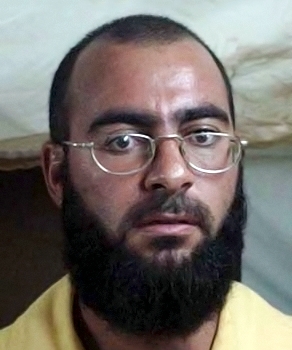
Ibrahim Awad Ibrahim al-Badri, commonly known by his nom de guerreAbu Bakr al-Baghdadi, was an Iraqi militant who was the first caliph of the Islamic State (IS) from 2014 until his death.
The 2011 Tikrit assault was an attack by the Islamic State of Iraq (ISI) organization that took place in the city of Tikrit, Iraq, on 29 March 2011, while the war was still ongoing. Reuters news agency included the attack in its list of deadliest attacks in 2011. ISI, which was then allied to al-Qaeda, claimed responsibility for killing 65 people and wounding over 100. At the time the United States Armed Forces were withdrawing. Tikrit was Saddam Hussein's birthplace.

The 2012–2013 Iraqi protests started on 21 December 2012 following a raid on the home of Sunni Finance Minister Rafi al-Issawi and the arrest of 10 of his bodyguards. Beginning in Fallujah, the protests afterwards spread throughout Sunni Arab parts of Iraq. The protests centered on the issue of the alleged sectarianism of Prime Minister Nouri al-Maliki. Pro-Maliki protests also took place throughout central and southern Iraq, where there is a Shia Arab majority. In April 2013, sectarian violence escalated after the 2013 Hawija clashes. The protests continued throughout 2013, and in December Maliki used security forces to forcefully close down the main protest camp in Ramadi, leaving at least ten gunmen and three policemen dead in the process.

Operation al-Shabah was launched in May 2013 by the Iraqi Army, with the stated aim of severing contact between the Islamic State of Iraq and the Levant and the al-Nusra Front in Syria by clearing militants from the border area with Syria and Jordan.

The Islamic State of Iraq, was a Salafi jihadist militant organization that fought the forces of the U.S.-led coalition during the Iraqi insurgency. The organization aimed to overthrow the Iraqi federal government and establish an Islamic state in Iraq.

Beginning in December 2012, Sunnis in Iraq protested against the Maliki government. On 28 December 2013, a Sunni MP named Ahmed al-Alwani was arrested in a raid on his home in Ramadi. Alwani was a prominent supporter of the anti-government protests. This incident led to violence in Al Anbar Governorate between the Iraqi Army and a loose alliance of tribal militias and other groups fighting alongside the Islamic State of Iraq and the Levant (ISIL).
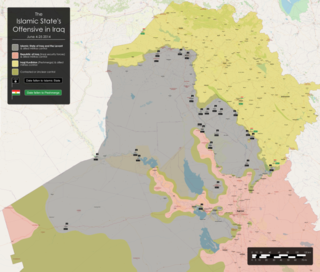
The Northern Iraq offensive began on 4 June 2014, when the Islamic State of Iraq and Levant, assisted by various insurgent groups in the region, began a major offensive from its territory in Syria into Iraq against Iraqi and Kurdish forces, following earlier clashes that had begun in December 2013 involving guerillas.
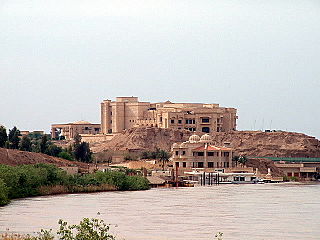
The First Battle of Tikrit was a battle for the Iraqi city of Tikrit following the city's capture by the Islamic State and Ba'athist Loyalists during the 2014 Northern Iraq offensive. The battle took place between 26 and 30 June 2014.

The Iranian intervention in Iraq has its roots in the post-2003 invasion of Iraq by the United States and allies when the infrastructure of the Iraqi armed forces, as well as intelligence, were disbanded in a process called "de-Ba'athification" which allowed militias with close ties to Tehran to join the newly reconstituted army.
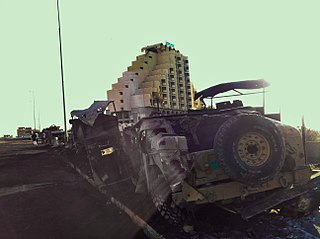
The fall of Mosul occurred between 4 and 10 June 2014, when Islamic State (IS) insurgents, initially led by Abu Abdulrahman al-Bilawi, captured Mosul from the Iraqi Army, led by Lieutenant General Mahdi Al-Gharrawi.

The Timeline of the War in Iraq covers the War in Iraq, a war which erupted that lasted in Iraq from 2013 to 2017, during the first year of armed conflict.
In early 2014, the jihadist group Islamic State of Iraq and the Levant captured extensive territory in Western Iraq in the Anbar campaign, while counter-offensives against it were mounted in Syria. Raqqa in Syria became its headquarters. The Wall Street Journal estimated that eight million people lived under its control in the two countries.
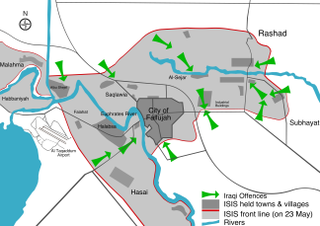
The Third Battle of Fallujah, code-named Operation Breaking Terrorism by the Iraqi government, was a military operation against ISIL launched to capture the city of Fallujah and its suburbs, located about 69 kilometres (43 mi) west of the Iraqi capital Baghdad. The operation began on 22 May 2016, three months after the Iraqi forces had started the total siege of Fallujah. On 26 June, Iraqi forces recaptured the city of Fallujah, before recapturing the remaining pocket of ISIL resistance in Fallujah's western outskirts two days later.

The Islamic State insurgency in Iraq is an ongoing low-intensity insurgency that began in 2017 after the Islamic State (ISIS) lost its territorial control in the War in Iraq, during which ISIS and allied White Flags fought the Iraqi military and allied paramilitary forces.
The Ninewa Operational Command (NOC) is a interagency command of the Iraqi Armed Forces and Iraqi Ministry of the Interior. Up until 2014 it had its headquarters in Mosul. It holds responsibility for all anti-ISIS operations in Ninewa Governorate.














